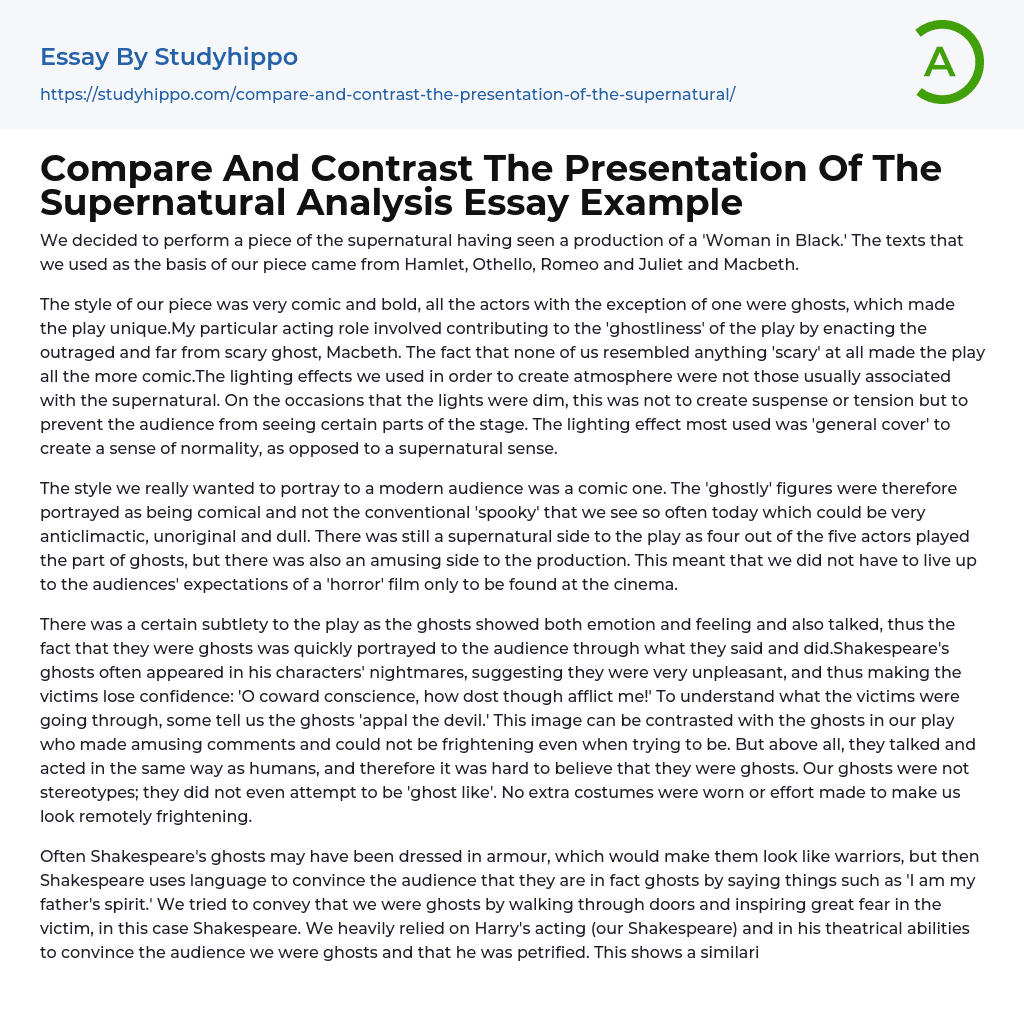

Compare And Contrast The Presentation Of The Supernatural Analysis Essay Example
We were inspired to create a supernatural performance after watching 'Woman in Black.' Our piece was based on texts from Hamlet, Othello, Romeo and Juliet, and Macbeth.
Our theatrical piece was characterized by a bold and comical style. It stood out because all of the actors were ghosts except for one, resulting in a unique performance. I played a role that contributed to the overall ghostly theme of the play - that of Macbeth, an outraged ghost who was far from intimidating. The lack of any scary-looking characters made our performance even more comedic. Although we used lighting effects to set the mood, they were not typical of what is usually associated with a supernatural theme. When the lights were dimmed, it wasn't to create tension or suspense, but merely to obscure specific parts of the stage. We relied heavily on general cove
...r lighting to achieve a normal atmosphere rather than a supernatural one.
Our aim was to present a comical style to the modern audience, even with the portrayal of 'ghostly' figures. We wanted to avoid the conventional 'spooky' style that often leads to anticlimactic, unoriginal and dull productions. Although four out of five actors played the part of ghosts, there was also a supernatural and amusing aspect to the play. This approach allowed us to exceed the typical expectations of a horror movie found only in the cinema.
The play's ghosts had a certain subtlety, displaying emotion and talking like humans which quickly conveyed their ghost status to the audience. Shakespeare's ghosts were often depicted as ominous and causing nightmares, resulting in loss of confidence. In contrast, our ghosts displayed amusing behavior and faile
to induce fear even when they tried. They acted and spoke in a human-like manner, making it difficult to believe they were ghosts. These ghosts didn't conform to stereotypes or utilize frightening costumes or behavior.
Shakespeare often dressed his ghosts in armor, giving them the appearance of warriors. However, he used language to convince the audience that they were actually ghosts, with lines such as 'I am my father's spirit.' To emulate this effect, we walked through doors and struck fear into Shakespeare as part of the performance. Harry's acting was crucial in convincing the audience that we were ghosts and that Shakespeare was petrified. This is reminiscent of Shakespeare's plays, where often ghosts were not physically present or didn't resemble traditional ghosts, requiring actors to convey that they were being haunted. The actors of Shakespeare's time had more difficulty without recorded sound, dry ice or smoke machines.
During the Elizabethan era, props and scenery were seldom used in plays, leading Elizabethan drama to rely mainly on the audience's imagination. The Globe theatre, in particular, commonly employed the use of trap doors, with ghosts bursting through them to shock and scare the audience. In Shakespeare's time, people were less exposed to frightening events, primarily because there were no television or films available to them. This made them more susceptible to fright and more cautious in general. Thus, it was easier for Shakespeare to capture his audience's attention with ghosts, as they were more likely to believe in them than we are today.
We are now more experienced with depictions of the supernatural through films and articles, and in Japanese theatre, 'Noh' plays specifically focus on this theme. Only
middle-aged men perform without masks, while female and elderly characters, as well as supernatural beings like ghosts, deities, demons, and divine beasts, wear intricately crafted masks. These masks are revered as both beautiful objects and powerful tools for expression, and do not require any accompanying make-up.
The carved masks depict various types of ghosts in Japanese folklore. Mischievous characters with long noses are represented, who trouble the people in Japanese villages whereas angry people transformed into demons with horns and sharp fangs to take revenge on their jealousy and anger. The Japanese folklore has a longstanding tradition of belief in ghosts, spirits, and demons, and the stories about them originate from mythology and superstition.
Folklore has developed to provide explanations or justifications for different natural occurrences. According to the Japanese, otherworldly entities are always present in their surroundings and must be appeased through performances to gain their favor. The Japanese spectators are wary due to the fact that unexplainable incidents inspire fear in people since they cannot predict or comprehend their sources.
- Marilyn Monroe essays
- Steven Spielberg essays
- Tom Brennan essays
- Actors essays
- Celebrity essays
- Magic essays
- Media essays
- Movies essays
- Music essays
- Roller coaster essays
- Television essays
- Video Game essays
- Adaptation essays
- Adventure essays
- Adversity essays
- Aging essays
- Alcohol essays
- Barbie Doll essays
- Beauty essays
- Care essays
- Carpe diem essays
- Change essays
- Chess essays
- Chicken essays
- Choices essays
- Contrast essays
- Crops essays
- Development essays
- Dream essays
- Evil essays
- Experience essays
- Family essays
- Farm essays
- Fire essays
- First Love essays
- Focus essays
- Greed essays
- Hero essays
- Holiday essays
- House essays
- Housing essays
- Humility essays
- Humor essays
- Hypocrisy essays
- Integrity essays
- Law of Life essays
- Life Changing Experience essays
- Life Experience essays
- Lifestyle essays
- Limitations essays



